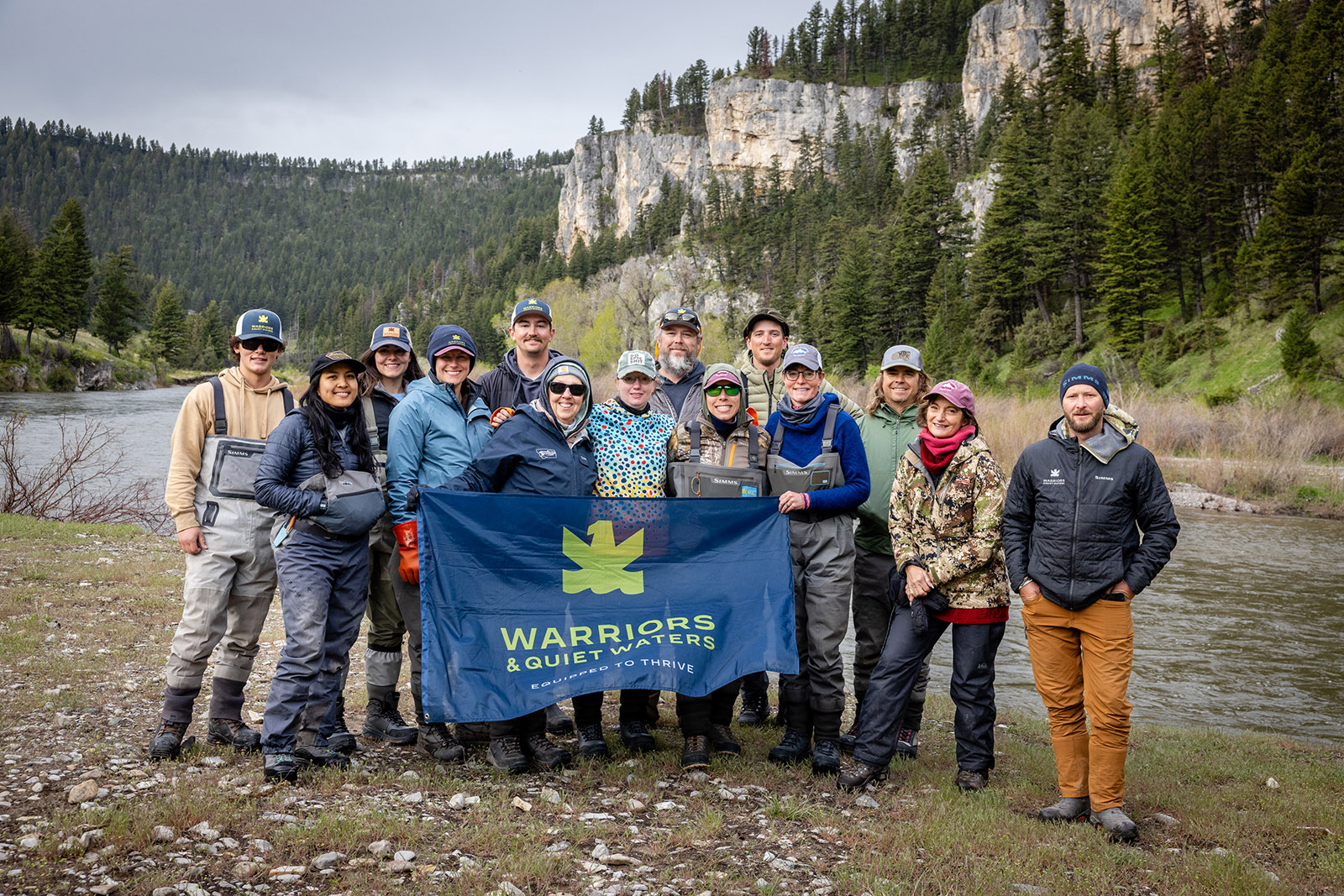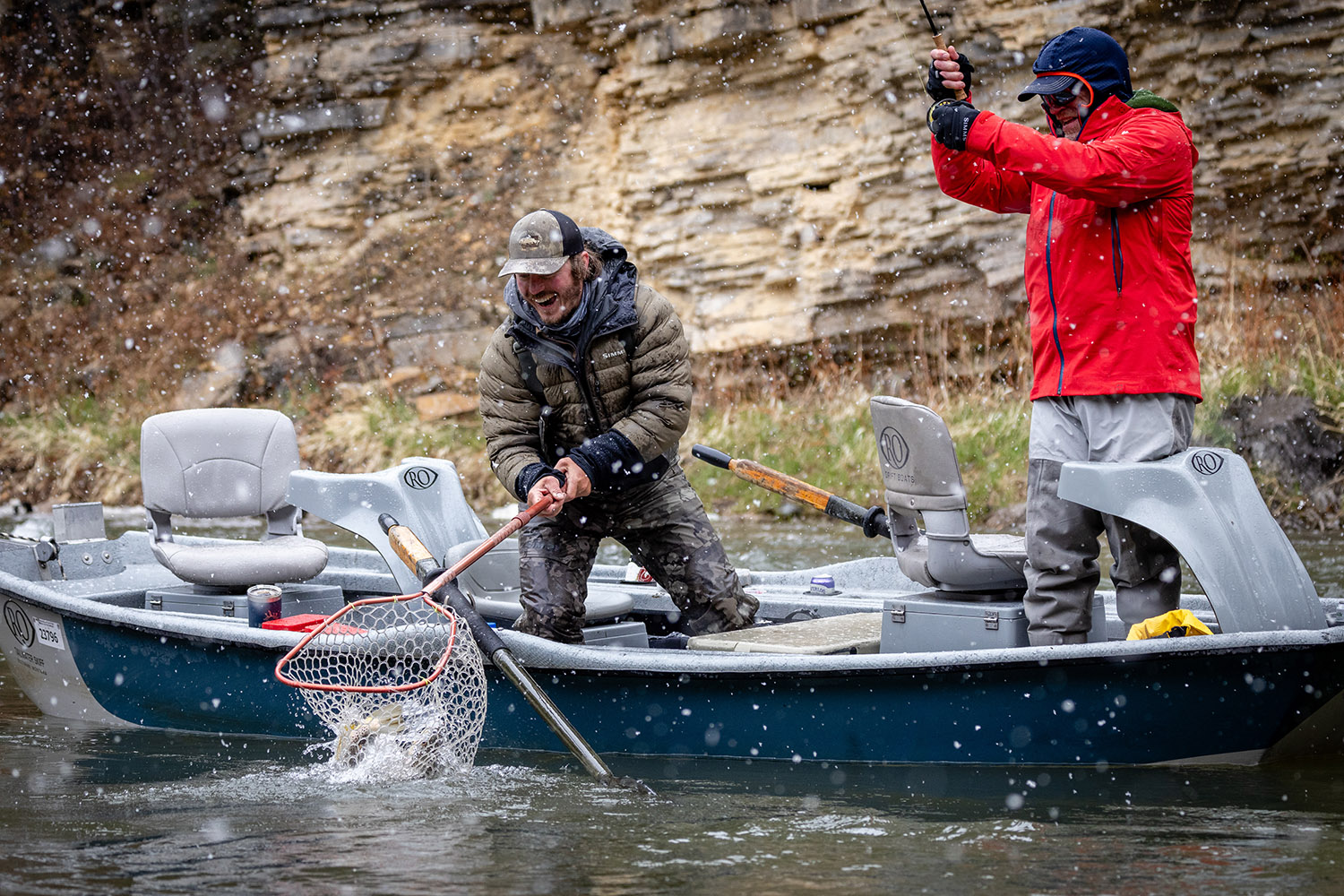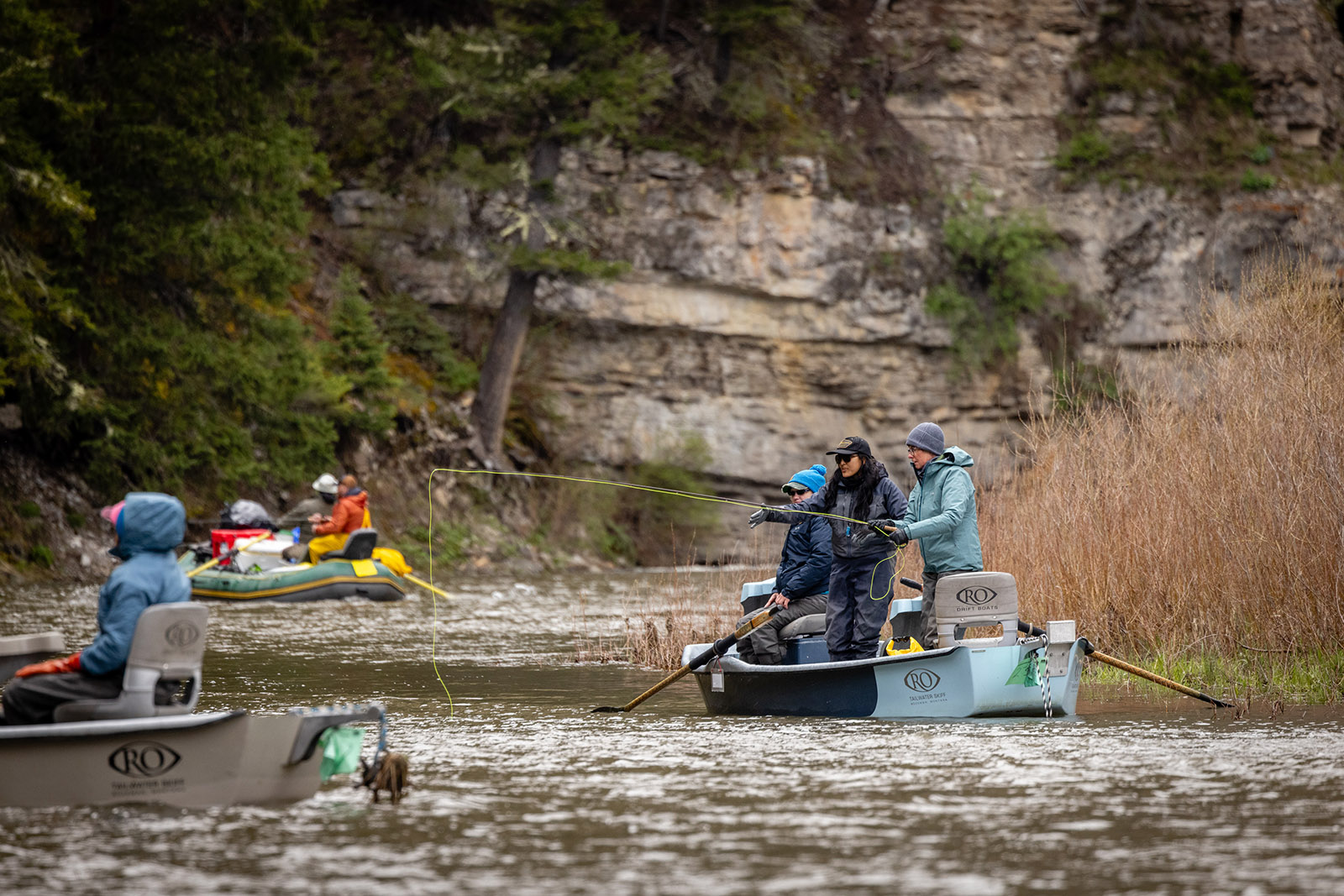Calming the Waters

by Katie Thomas
It’s sometimes said that fly fishing is the world’s most hopeful pastime. From the newbie angler to the seasoned, even the slight possibility of snagging that 18-inch rainbow brings endless joy and anticipation. Optimism is indeed a requirement when embarking on a fishing expedition; otherwise, why bother? But not everyone comes by optimism easily. For retired combat veterans, these feelings can be among the first to go when abruptly returning to civilian life. That’s where the Warriors & Quiet Waters Foundation (WQW) comes in—a Bozeman-based nonprofit serving post-9/11 combat veterans and their families from all branches of service.
Founded in 2007 by Bozeman native and retired Marine colonel Eric Hastings, WQW runs a selection of outdoor programs infused with community, empowerment, and purpose. The return to civilian existence may be some veterans’ first adult experience without a built-in team of cohorts, sense of duty, or even basic needs like food and shelter provided. Wounded vets struggle with not just their physical wounds—they may also suffer from anxiety, depression, sleep deprivation, suicidal thoughts, and post-traumatic stress (PTS).
Colonel Hastings knows exactly what that feels like. After growing up fly fishing, he spent three decades flying an A-4 Skyhawk, including 168 combat missions in Vietnam. Throughout, Hastings utilized fly fishing between missions as a way to cope with the weight of his wartime PTS. Hastings knew he wasn’t the only one grappling with post-service life, and he made it his new mission to help warriors and their loved ones thrive. As Hastings puts it, “It’s necessary that post-traumatic growth replace post-traumatic stress. That’s what WQW does.”

WQW has grown from an all-volunteer organization with one program to what it is today: the robust Built For More (BFM) program, an immersive three-track program offering nine months of in-person and online fly fishing, photography, and hunting, run by a devoted crew of staff and volunteers, and led since 2020 by retired U.S. Marine Colonel Brian Gilman. Gilman, who hails from Butte, led four combat tours in Iraq and Afghanistan, and completed his service as Chief of Staff of the Marine Forces Special Operations Command. He is visibly passionate about WQW’s mission and has worked tirelessly to advance the program.
“Wounded vets struggle with not just their physical wounds—they may also suffer from anxiety, depression, sleep deprivation, suicidal thoughts, and post-traumatic stress (PTS).“
“We find that the immense sense of loss—of identity, connection, and purpose—that veterans feel when they leave the military is a relatively unknown issue in the civilian world,” Gilman explains. “So we built a researched-based program, which is also an outdoor-recreation-based program—but it’s recreation for a purpose. It’s designed to build strength in our pillars of a thriving life: security, connection, community, values, potential, and purpose.”
Participants fly into Bozeman for the initial week of fishing, photography, or hunting and stay at Quiet Waters Ranch, run by staff and volunteers, and sprinkled with fishing ponds and home-cooked meals. They’re fully outfitted with all the gear they need, at no cost to the veterans. Ditto the transportation, accommodations, meals, and professional instruction.
“It’s the self-discipline, physical condition, and right mental attitude needed to survive an elk-hunting situation in wilderness. You don’t get there without preparation and commitment. Same goes for fishing—it’s about learning enough about the environment to be able to catch a fish.”
–Col. Eric Hastings
After that first week at the ranch, participants return home for the online portion, and come back eight months later for their capstone experience. For fishing, this may be a 10-mile jaunt into the high-mountain lakes of the Pioneers, or a flight to Florida for a saltwater-fishing expedition, or a trip to North Dakota for an ice-fishing experience.
Brrr. But never fear; cold-weather apparel and fishing gear is provided free of charge to the warriors, and it’s theirs to keep. Local companies like Simms Fishing, Mystery Ranch Backpacks, Dr. Slick, Brodin Nets, Straight Six Archery, FHF Gear, and Sitka regularly provide equipment, either donated or at a heavy discount. Some vendors come to the ranch for customizations for a participant who has different needs. “We’ve been really successful at enabling everyone to do the same activities,” says Jesse LeNeve, WQW’s Director of Program Operations. “Someone might be missing multiple limbs, and that doesn’t change anything—everyone does the same activity.”
It’s not simply taking somebody fishing or bow hunting, Hasting explains. “It’s the self-discipline, physical condition, and right mental attitude needed to survive an elk-hunting situation in wilderness. You don’t get there without preparation and commitment. Same goes for fishing—it’s about learning enough about the environment to be able to catch a fish.”

To this end, WQW has partnered with MTNTOUGH in Bozeman, a training gym where hunting-program participants have access to everything for free—equipment, coaching, and programming. Another key partner is Randy Newberg of the show Fresh Tracks, who has assisted in teaching hunting tactics, elk calling, and the like. “All our participants are equipped with everything they need to go through the program,” Gilman says. “We simply would not be able to do what we do without the generosity of these partners.”
Uniquely, WQW also offers a Military Caregiver Program, which is similar to the BFM program, but it’s for the caregivers of wounded vets. “It’s a very rare program,” says LeNeve. “Usually it’s the vet going somewhere, while the caregiver’s job still continues back home—they still have children, jobs, life.”
The success of WQW is not only visible in the participants’ lives; it’s also well-documented. “We know the impact of our programs, because we measure what we do,” Gilman says. “We work with the Institute for Veterans and Military Families at Syracuse University, which does all our impact evaluation. We know from our 2023 evaluation that we’ve achieved significant outcomes for our participants: we’ve quadrupled their sense of thriving, we’ve made them three times more resilient, we’ve doubled their sense of purpose.”

This is the goal of WQW, because they know that post-combat challenges persist for a lifetime. “Even though we’re two years beyond the end of Afghanistan, there’s still an epidemic of veteran suicide,” Gilman says. “They’re not just dying because they have TBI or PTS—they’re also dying because they’ve lost their purpose in life.” Adds Hastings, “Because of Brian’s particular expertise, our program teaches people how to cope with these things in productive ways, and to turn their self-discipline back on. So when people ask me what it’s all about, I tell them it’s about unconditional love. And that doesn’t happen in America, in a corporate setting, in a hospital, in a veterans’ center, but it happens with WQW. What we do is something every warrior should receive.”
To learn more, or if you or someone you know is struggling with post-9/11 combat trauma, visit warriorsandquietwaters.org.
